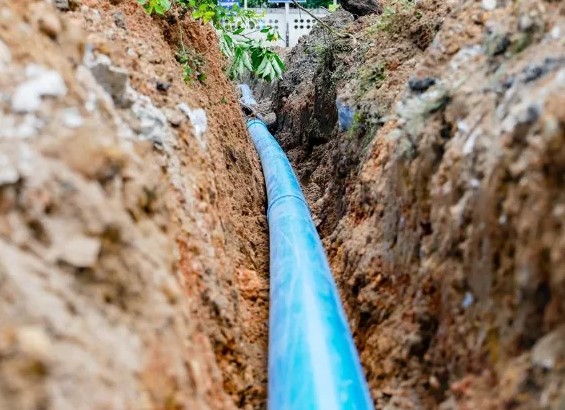Water Line Servicesin Port Huron MI
Water Line Installation to Ensure Steady and Clean Water Supply
We Are Locally Owned & Operated For Over 37 Years
Contact Us Today!
We Serve Businesses In And Around The Following Cities:
About Water Line Services
Understanding Water Line Infrastructure in Port Huron
Nestled by the glistening waters of Lake Huron and the St. Clair River, the city of Port Huron is known for its breathtaking views and unique charm. But below the city’s surface operates an intrinsic and vast water line system, an essential component to the city’s bustling commercial landscape. Establishing, maintaining, and upgrading a commercial property’s water line forms a significant pillar of any business operation in Port Huron, and an understanding of these services is imperative.
Role of the Water Line in Commercial Properties
When you turn the faucet on in a commercial establishment—whether it be a bustling restaurant or a lively start-up—the water that gushes out is delivered via a network of pipes. These pipes collectively form what is known as a water line. From the main line connected to public water sources, through the various sink water lines, toilet water lines, and flex or flexible water lines, each serves a unique purpose and function, contributing directly to any commercial entity’s daily operations.
Yet the role that these water lines play often goes unrecognized until a leak or break manifests leading to an echo of service calls searching for “water line repair near me”. These are the times when services like D&J Contracting can be a knight in shining armor; a savior in the depths of a water line crisis.
Water Line Materials: A Comparative Study
Water lines today are constructed using different materials, the most common ones being copper and plastic. Traditional copper lines are robust and resistant to corrosion but are expensive to install and maintain. The modern-day alternative to copper lines is the PEX (Cross-linked Polyethylene) water line. PEX lines are less expensive, flexible, and easier to install, making them a popular choice for modern commercial properties.
However, there is another player in the game—black water lines, typically made of polyethylene or PVC. They are durable, economical, and often used for applications that demand high-volume water delivery. More specific to commercial use, businesses are recognizing the benefits of insulated water lines in Port Huron. These lines protect against freezing temperatures, eliminating the risk of bursting and the expense of main water line leak repair.
Trenchless Water Line Replacement: Maximum Efficiency, Minimum Disruption
Imagine needing to replace the water service line that runs the breadth of your property, and dreading the thought of trenches dug up across your landscape. This is where the magic of trenchless water line replacement comes in, a process highly acclaimed for causing minimal surface disruption. This innovative technique involves tunneling under the ground surface to replace or repair damaged water lines, preserving property aesthetics and operational continuity.
With companies like D&J Contracting offering trenchless water line services in Port Huron, the days of surface destruction are becoming an unwelcome memory. They marry cutting-edge technology with years of expertise, embodying the future of water line replacement.
Capitalizing on Professional Water Line Services
Everything comes with a cost – both time and monetary. For businesses in Port Huron counting every cent, the main water line to house cost can seem like a steep expense. However, DIY methods and inexperienced hands often lead to higher main water line leak repair costs in the long run.
On the contrary, professional services like D&J Contracting offer comprehensive water line solutions—from water line repairs to water line replacement—all under one roof. They guarantee a meticulous, efficient and timely repair process ensuring minimal down-time and disruption to business operations.
As a conscientious business, understanding the importance of professional water-line services cannot be overstated. Reliability and efficacy coupled with cost-effective solutions make professional water-line services an investment rather than an expenditure. And in a thriving commercial landscape like Port Huron, keeping the water piping across your property in prime condition correlates directly to uninterrupted operations and business continuity.
As we delve into the depth of Lake Huron’s waters, let us not forget the unseen yet significant arteries coursing beneath our city—the commercial water lines. Offering a lifeline to our businesses and being a primary driver of continuity, they deserve the same attention and upkeep as other areas of operation. Here’s to maintaining Port Huron’s heart, pulse, and its water lines.
Water Line Services Gallery


Call Us Today to receive your Free Quote for
Water Line in Port Huron
Serving: Port Huron, Michigan

About Port Huron, Michigan
This area was long occupied by the Ojibwa people. French colonists had a temporary trading post and fort at this site in the 17th century.
In 1814, following the War of 1812, the United States established Fort Gratiot at the base of Lake Huron. A community developed around it. The early 19th century was the first time a settlement developed here with a permanent European-American population. In the 19th century, the United States established an Ojibwa reservation in part of what is now Port Huron, in exchange for their cession of lands under treaty for European-American settlement. But in 1836, under Indian Removal, the US forced the Ojibwa to move west of the Mississippi River and resettle in what are now the states of Wisconsin and Minnesota.
In 1857, Port Huron became incorporated. Its population grew rapidly after the 1850s due a high rate of immigration: workers leaving poverty, famine, and revolutions in Europe were attracted to the successful shipbuilding and lumber industries in Michigan. These industries supported development around the Great Lakes and in the Midwest. In 1859 the city had a total of 4,031 residents; some 1,855, or 46%, were foreign-born or their children (first-generation Americans).
By 1870, Port Huron’s population exceeded that of surrounding villages. In 1871, the State Supreme Court designated Port Huron as the county seat of St. Clair County.
On October 8, 1871, the city, as well as places north in Sanilac and Huron counties, burned in the Port Huron Fire of 1871. A series of other fires leveled Holland and Manistee, as well as Peshtigo, Wisconsin and Chicago, Illinois on the same day. The Thumb Fire that occurred a decade later, also engulfed Port Huron.
In 1895 the village of Fort Gratiot, in the vicinity of the former Fort Gratiot, was annexed by the city of Port Huron.
The following historic sites have been recognized by the State of Michigan through its historic marker program.
- Fort St. Joseph. The fort was built in 1686 by the French explorer Duluth. This fort was the second European settlement in lower Michigan. This post guarded the upper end of the St. Clair River, the vital waterway joining Lake Erie and Lake Huron. Intended by the French to bar English traders from the upper lakes, the fort in 1687 was the base of a garrison of French and Indian allies. In 1688 the French abandoned this fort. The site was incorporated into Fort Gratiot in 1814. A park has been established at the former site of the fort.
- Fort Gratiot Light. The Fort Gratiot Lighthouse was built in 1829 to replace a tower destroyed by a storm. In the 1860s workers extended the tower to its present height of 84 feet (26 m). The light, automated in 1933, continues to guide shipping on Lake Huron into the narrow and swift-flowing St. Clair River. It was the first lighthouse established in the State of Michigan.
- Lightship Huron. From 1935 until 1970, the Huron was stationed in southern Lake Huron to mark dangerous shoals. After 1940 the Huron was the only lightship operating on the Great Lakes. Retired from Coast Guard Service in 1970, she was presented to the City of Port Huron in 1971.
- Grand Trunk Railway Depot. The depot, which is now part of the Port Huron Museum, is where 12-year-old Thomas Edison departed daily on the Port Huron–Detroit run. In 1859, the railroad’s first year of operation, Edison convinced the railroad company to let him sell newspapers and confections on the daily trips. He became so successful that he soon placed two newsboys on other Grand Trunks running to Detroit. He made enough money to support himself and to buy chemicals and other experimental materials.
- Port Huron Public Library. In 1902 the city of Port Huron secured money from philanthropist Andrew Carnegie to erect a municipal library and arranged for matching operating funds. In 1904, a grand Beaux-Arts-style structure was built at a cost of $45,000. At its dedication, Melvil Dewey, creator of a widely used book classification system, delivered the opening address. The Port Huron Public Library served in its original capacity for over sixty years. In 1967, a larger public library was constructed. The following year the former library was renovated and re-opened as the Port Huron Museum of Arts and History. An addition was constructed in 1988.
- Harrington Hotel. The hotel opened in 1896 and is a blend of Romanesque, Classical and Queen Anne architecture. The hotel closed in 1986, but a group of investors bought the structure that same year to convert it into housing for senior citizens. The Harrington Hotel is listed on the National Register of Historic Places.
- Grand Trunk Western Railroad Tunnel. The tunnel was opened in 1891 and links Port Huron with Canada. This international submarine railway tunnel was the first international tunnel in the world. The tunnel’s total length is 6,025 feet (1,836 m), with 2,290 feet (700 m) underwater. The tunnel operations were electrified in 1908; half a century later they were converted to use diesel fuel. Tracks were lowered in 1949 to accommodate larger freight cars. During World War I, a plot to blast the tunnel was foiled. A new tunnel has since been opened.
The city was hit by a violent F4 tornado on May 21, 1953, damaging or destroying over 400 structures, killing two, and injuring 68.
The city received the All-America City Award in 1955 and 2005.
In June 1962, the Port Huron Statement, a New Left manifesto, was adopted at a convention of the Students for a Democratic Society. The convention did not take place within the actual city limits of Port Huron, but instead was held at a United Auto Workers retreat north of the city (now part of Lakeport State Park). A historical marker will be erected on the site in 2025.
Port Huron is the only site in Michigan where a lynching of an African-American man took place. On May 27, 1889, in the early morning, a mob of white men stormed the county jail to capture 23-year-old Albert Martin. A mixed-race man, he was accused of attacking a woman. They hanged him from the 7th Street Bridge. A memorial was installed in 2018 at the site, recounting Martin’s history. The city collaborated with the Equal Justice Initiative on this memorialization.
On November 11, 2017, veterans from around the country, such as Dave Norris, Clitus Schuyler, and Lou Ann Dubuque, joined together at a cemetery in Port Huron to share the significance of Veterans Day.
In April 2023, the Pere Marquette Railway bascule bridge was demolished after a nearly decade long battle between preservationists and the Port Huron Yacht Club. Built in 1931, the structure was eligible for listing on the National Register of Historic Places, and was one of only six similar bridges remaining in the US.
-
 Port Huron circa 1902
Port Huron circa 1902 -
 Huron Avenue in 1912
Huron Avenue in 1912 -
 St. Clair Tunnel in 1907
St. Clair Tunnel in 1907 -
 Gratiot Lighthouse in 1902
Gratiot Lighthouse in 1902 -
 Fort Gratiot Lighthouse
Fort Gratiot Lighthouse -
 The Pere Marquette Railway bridge as seen in 2021, it was demolished in 2023.
The Pere Marquette Railway bridge as seen in 2021, it was demolished in 2023.
According to the United States Census Bureau, the city has a total area of 12.26 square miles (31.75 km), of which 8.08 square miles (20.93 km) is land and 4.18 square miles (10.83 km) is water. The city is considered to be part of the Thumb area of East-Central Michigan, also called the Blue Water Area. The easternmost point (on land) of Michigan can be found in Port Huron, near the site of the Municipal Office Center and the wastewater treatment plant. The Black River divides the city in half, snaking through Port Huron and emptying into the St. Clair River near Downtown.
Port Huron has a humid continental climate (Köppen climate classification Dfa) with hot summers, cold winters and rain or snow in all months of the year.
| Census | Pop. | Note | %± |
|---|---|---|---|
| 1850 | 1,584 | — | |
| 1860 | 4,371 | 175.9% | |
| 1870 | 5,973 | 36.7% | |
| 1880 | 8,883 | 48.7% | |
| 1890 | 13,543 | 52.5% | |
| 1900 | 19,158 | 41.5% | |
| 1910 | 18,863 | −1.5% | |
| 1920 | 25,944 | 37.5% | |
| 1930 | 31,361 | 20.9% | |
| 1940 | 32,759 | 4.5% | |
| 1950 | 35,725 | 9.1% | |
| 1960 | 36,084 | 1.0% | |
| 1970 | 35,794 | −0.8% | |
| 1980 | 33,981 | −5.1% | |
| 1990 | 33,694 | −0.8% | |
| 2000 | 32,338 | −4.0% | |
| 2010 | 30,184 | −6.7% | |
| 2020 | 28,983 | −4.0% | |
| U.S. Decennial Census | |||
Port Huron is the largest city in the Thumb area, and is a center of industry and trade for the region.
As of the census of 2010, there were 30,184 people, 12,177 households, and 7,311 families residing in the city. The population density was 3,735.6 inhabitants per square mile (1,442.3/km). There were 13,871 housing units at an average density of 1,716.7 per square mile (662.8/km). The racial makeup of the city was 84.0% White, 9.1% African American, 0.7% Native American, 0.6% Asian, 1.2% from other races, and 4.5% from two or more races. Hispanic or Latino of any race were 5.4% of the population.
There were 12,177 households, of which 32.5% had children under the age of 18 living with them, 34.5% were married couples living together, 19.9% had a female householder with no husband present, 5.6% had a male householder with no wife present, and 40.0% were non-families. 33.0% of all households were made up of individuals, and 11.8% had someone living alone who was 65 years of age or older. The average household size was 2.42 and the average family size was 3.03.
The median age in the city was 35.8 years. 25.6% of residents were under the age of 18; 9.9% were between the ages of 18 and 24; 26.3% were from 25 to 44; 25.2% were from 45 to 64; and 13.1% were 65 years of age or older. The gender makeup of the city was 47.8% male and 52.2% female.
The city government is organized under a council–manager government form. The City Council is responsible for appointing a city manager, who is the chief administrative officer of the city. The manager supervises the administrative affairs of the city and carries out the policies established by the City Council. As the Chief Administrative Officer, the City Manager is responsible for the organization of the administrative branch and has the power to appoint and remove administrative officers who are responsible for the operation of departments which carry out specific functions. The City Council consists of seven elected officials—a mayor and six council members. Beginning with the 2011 election, citizens voted separately for Mayor and Council. Council members will serve staggered four-year terms and the mayor will serve a two-year term. The current mayor is former city clerk Pauline Repp. The city levies an income tax of 1 percent on residents and 0.5 percent on nonresidents.
Federally, Port Huron is part of Michigan’s 9th Congressional District, represented by Republican Lisa McClain, elected in 2022.
- Port Huron Northern High School
- Port Huron High School
- Harrison Center
- St. Clair County Community College
Call Us Today to receive your Free Quote for
Water Line in Port Huron
Related Services in Port Huron, Michigan
We Serve Businesses In The Following Zip Codes:
48007, 48015, 48021, 48026, 48035, 48036, 48038, 48042, 48043, 48044, 48045, 48046, 48047, 48048, 48050, 48051, 48066, 48071, 48080, 48081, 48082, 48083, 48084, 48085, 48088, 48089, 48090, 48091, 48092, 48093, 48098, 48099, 48225, 48230, 48236, 48310, 48311, 48312, 48313, 48314, 48315, 48316, 48317, 48318, 48397





